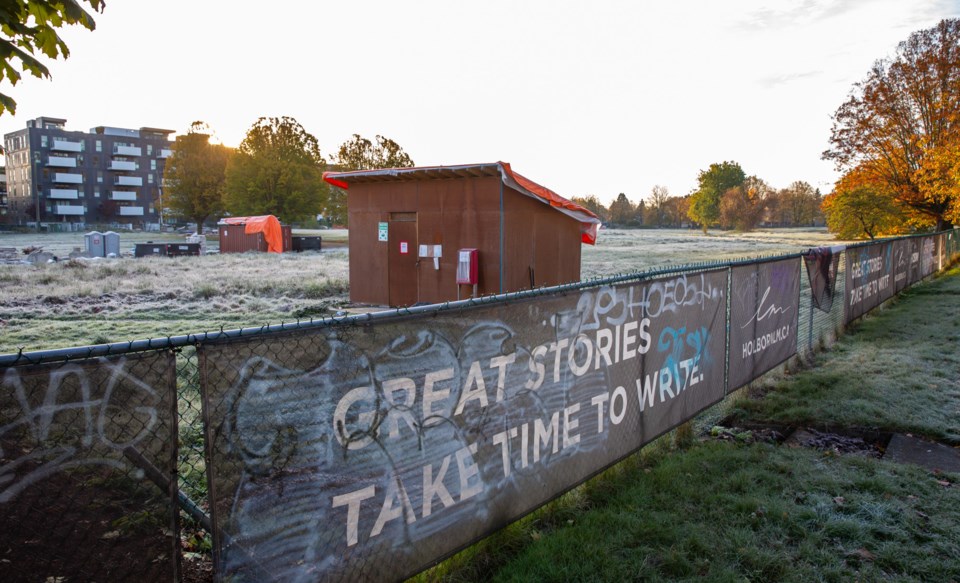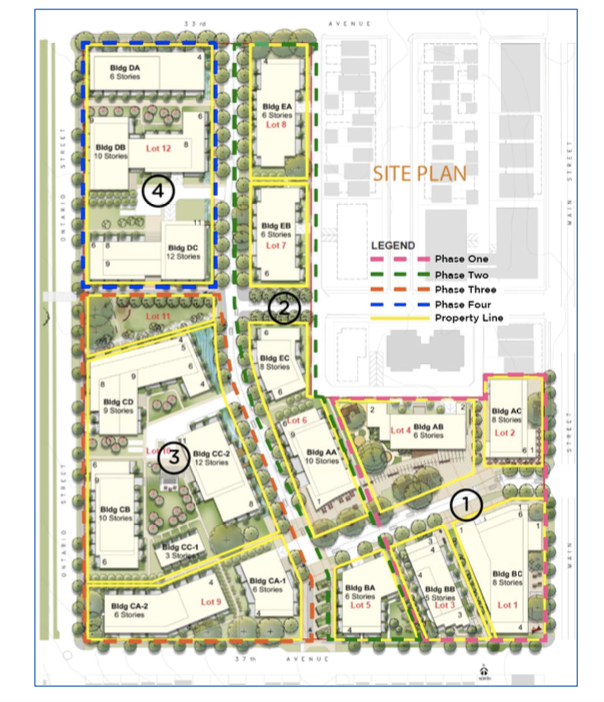The developer behind the massive Little Mountain project in Vancouver that has sat largely idle for 15 years has promised that all 282 social housing units slated for the 15-acre property will be built before the end of 2026.
Joo Kim Tiah of Holborn Properties Ltd. said a 53-unit building is already open, another 62 units are under construction and there are plans to break ground next year on the remaining units, with completion dates expected over the next three years.
“That’s the goal,” Tiah told Glacier Media Wednesday before leaving city hall.
Tiah was at city hall to attend a council meeting, where the ABC Vancouver contingent amended a housing agreement with Holborn that removes “occupancy permit holds” for three of the 12 lots designated for market housing.
The holds — a standard practice in contracts — were in place so that Holborn would have to first build all the social housing before proceeding with the market units. That requirement was based on the property once being home to 224 units of 1954-era social housing that had deteriorated and was later demolished.
Several hundred tenants were displaced.
None of the proposed 1,500 market units has been built on the property, which is bounded by 33rd to 37th avenues between Main and Ontario streets, near Queen Elizabeth Park.
'If I don't do that, I'm in trouble'
The move Wednesday by council does not guarantee all the social housing will be built before the market units. Tiah did not speak to council, but told Glacier Media that Holborn is committed to an agreement with BC Housing to finish the social housing component of the development.
“There's a covenant on title that requires me to build the social housing,” he said of the deal he signed with the B.C. government 15 years ago to buy the property for $334 million. “I need to build the social housing so we can pay back [the loan from] the province. If I don't do that, I'm in trouble.”
At the same time, he suggested one of the market buildings could be built before all the social housing is completed — a move, he said, that is tied to securing financing and moving forward with the project.
The rationale city staff provided for removing the occupancy permit holds is that Holborn said it is unable to obtain financing for the first two phases of the market units without unlocking the holds on three lots.
Holborn told staff it wants to launch pre-sales for an 87-unit market building by the end of the year and simultaneously submit development permit applications for three other buildings; the staff report says the number of units for those three buildings hasn’t been determined.
“The banks will not finance us when there's such strict occupancy holds on the delivery of social housing, and that's essentially why we are asking for this,” said Tiah, noting the financing would cover servicing the entire site, including the social housing lots. “When you develop anything, you finance a whole lot of it from the banks.”
Added Tiah: “People get the false impression that we’re getting a sweetheart deal and making a lot of money. But that's far from it. The truth is, Holborn doesn't stand any chance of making any money until the last phase of this project. We have dumped a lot of equity into this project [$86 million]…and we haven’t made a penny.”

$211-million loan, $88-million line of credit
The Little Mountain purchase and sale agreement from 2008 said Holborn was to pay $334 million for the property. Reporting by Glacier Media in 2021 indicated Holborn had paid $35 million of the $334 million.
At the time, government said Holborn was given a $211-million loan and an $88-million "credit" towards the promised construction of 234 social housing units on the property. Tiah disputed the government information, saying it was $191 million and not a loan — "it's a phased payment structure for the purchase of the lands. The $88 million is not a line of credit, it's a loan for the construction of the non-market housing."
The additional 48 units of social housing for the city-owned building — an addition that was not in the original agreement with government — is estimated to cost Holborn $43 million, according to Tiah.
The city building will also incorporate a neighbourhood house, a child-care facility, public plaza and park.
Tiah acknowledged the $88 million will now not cover the cost of the 234 units, but said that was not the reason for requesting council remove the occupancy permit holds on the market housing lots.
“Even if I have financing for the social housing, if I don't have any financing to do the market, then you're going to see a huge gap, a huge lag between the social housing being completed and no market housing being built at all,” he said.
Asked how much money Holborn has repaid on the loans, Tiah said it was more than the $35 million reported in 2021. He couldn’t immediately confirm a figure, but suggested it was closer to $60 million. (Tiah has since contacted Glacier Media to say it was $40 million).
A government spokesperson in 2021 said the remaining balance, regardless of work done, must be repaid to BC Housing by Dec. 31, 2031, and will begin to bear interest after Dec. 31, 2026.
Dan Garrison, the city’s director of housing policy and regulation, described the request to remove the occupancy permit holds as “unusual.” But, Garrison added, staff recommended the holds be removed after assurances from BC Housing that legal mechanisms are in place to ensure the social housing gets built.
“This is one of the main reasons why we're comfortable making this as a recommendation to council in response to the request [from Holborn],” he said.

'It is ludicrous'
OneCity Coun. Christine Boyle and Green councillors Adriane Carr and Pete Fry opposed staff’s recommendation, arguing that Holborn is a wealthy company and has held the land for 15 years without building all 282 social housing units.
“This is a multinational company with billions of dollars in assets, and they're coming to us saying that they can't finance the condos they plan to build and want to get off the hook on building the social housing as quickly,” Boyle said.
“I don't believe it. I think it is ludicrous. Quite frankly, I think it's infuriating. There have been too many delays, too many excuses. Enough is enough.”
In her remarks, Carr pointed to the tenants of the 1954-era townhouse-like housing that was demolished at Little Mountain with the promise for those displaced to return to new suites. She predicted there will be further delays because of ABC Vancouver’s move to amend the housing agreement with Holborn.
“It's been a huge source of aggravation,” she said. “I've met with too many families in tears over their displacement and the lack of due diligence to move forward with the housing to replace the housing that they lost.”
Fry described Holborn as a “very well financially-leveraged corporation” and pointed out the company owns the former single-room-occupancy Dunsmuir Hotel property, which takes up a downtown city block.
“That has remained vacant and boarded up for well over 20 years, and depriving even more very necessary and important housing in the city of Vancouver,” said Fry, who also noted Holborn owns the former Trump hotel and other properties in B.C.
“I don't think that this has been a fair process from the get-go. And I don't think that this has been a good faith agreement with the developer of this particular property. It's been going on for far too long, and I think we have to just say, ‘No, enough is enough.’”

'Pragmatic and practical'
ABC Vancouver Coun. Rebecca Bligh called the issue “a tough situation,” agreeing with all councillors who said that displacement of families from the site shouldn’t have happened.
At the same time, Bligh said the project has to move forward and has faith in the assurances from BC Housing that the social housing will get built.
“To not support that is purely political, to support it is pragmatic and practical,” she said. “So do I want to give this break to Holborn? No, I have no interest in that. Do I want to deliver these housing units and unlock this site and help the community move on? One hundred per cent, and that's why I'll be supporting it.”
Bligh’s rationale for amending the housing agreement was echoed by her ABC Vancouver colleagues, who pointed to assurances from BC Housing, which sent a letter of support to council that was attached to the staff report.
“If Holborn does not deliver the social housing, [the government can] either take the site back, foreclose on it and ensure that those units get delivered,” said Coun. Peter Meiszner. “That gives me a lot of confidence that this is the right pathway forward.”
Answering a question that many have raised — why has the project taken so long to build? — Tiah told Glacier Media that Holborn wasn’t allowed to apply for rezoning until 2013. Council approved rezoning in 2016 and didn’t enact it until 2018.
Then the COVID-19 pandemic was declared in 2020, followed by inflation and rising construction costs, he said, noting that Holborn has still delivered one 53-unit social housing building, has a 62-unit building under construction and will break ground on the rest of the units next year.
“And they say I’m not doing anything,” he said.
Outside city hall, Tiah approached Boyle about setting up a meeting to further discuss the project.
'Low-income community bulldozed'
Council’s move Wednesday comes two years after the B.C. government announced in September 2021 that it signed an agreement with the City of Vancouver and Holborn aimed at accelerating construction on social housing.
A news release from government said the memorandum of understanding between the three parties prioritized the construction of non-market housing on the property and to have it completed and ready for occupancy no later than Dec. 31, 2024.
Premier David Eby was attorney general and minister responsible for housing when the government signed that agreement.
“Enough is enough with the Little Mountain tragedy that was orchestrated by the previous government that resulted in a low-income community bulldozed, an interest-free loan of hundreds of millions of dollars and a massive empty lot growing weeds in the middle of a housing crisis,” Eby said at the time.
However, Eby also acknowledged to reporters that nothing in the memorandum of understanding is enforceable. Eby described it as a "good faith" agreement, saying Holborn could have refused to participate.
“The fact that Holborn didn't have to enter into this [agreement] — and the fact that if they don't meet these commitments it will simply result in more bad press — indicates to me that there is reason for optimism that we can get this done,” he said.
Note: This story has been updated to add some information from the developer regarding financial details disputing the B.C. government's information in 2021 that said Holborn was given a $211 million loan and "credit" of $88 million.


